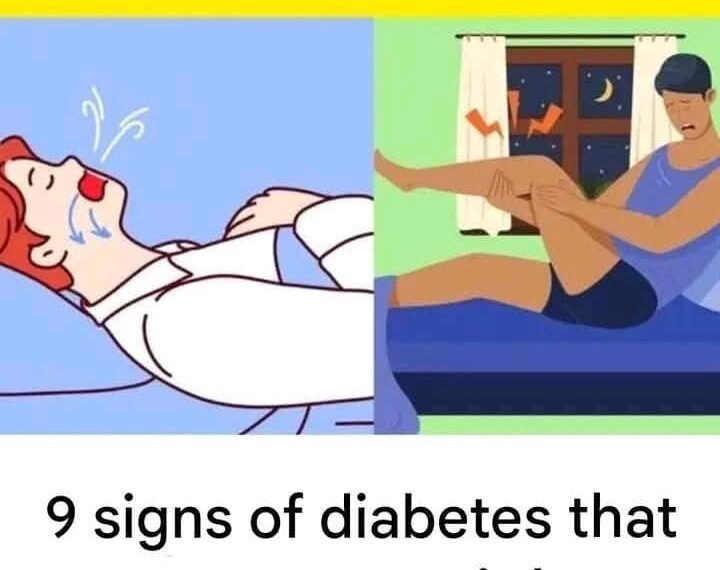If you toss and turn all night or suffer from painful leg cramps while you sleep, it might be linked to diabetes.
The connection:
High blood sugar can lead to nerve damage, known as diabetic neuropathy, which often starts in the legs and feet. This nerve damage can cause discomfort, tingling, or cramps that interrupt restful sleep.
How to recognize it:
You may notice persistent tingling, burning, or numbness in your feet that worsens at night.
Management:
Good blood sugar control, proper foot care, and sometimes medication can help manage neuropathy symptoms and improve sleep quality.
4. Dry Mouth and Increased Thirst
Waking up with a dry mouth or a strong urge to drink water during the night can also be linked to diabetes.
What causes this?
Excessive urination pulls fluids from your body, leading to dehydration. This dehydration causes dry mouth and increased thirst as your body tries to replenish lost fluids.
Why it matters:
These symptoms can signal uncontrolled blood sugar levels and risk of further complications.
Tip:
Keeping water by your bedside is helpful, but if dry mouth persists, it’s important to discuss this with your healthcare provider.
5. Blurred Vision Upon Waking
Have you ever woken up with blurry or distorted vision? It might be a subtle sign of blood sugar fluctuations.
How does diabetes cause this?
High blood glucose can cause fluid shifts in the lens of your eyes, leading to temporary changes in vision. These changes are more noticeable in the morning after prolonged fasting.
When to act:
Persistent blurred vision should always be evaluated by an eye specialist, especially if you have other symptoms of diabetes.
6. Headaches in the Morning
Frequent morning headaches can sometimes be linked to blood sugar levels.
Why?
Both high and low blood sugar levels can trigger headaches. Overnight blood sugar fluctuations may cause dehydration or changes in blood flow, contributing to headaches upon waking.
What to do:
If morning headaches occur regularly, consider tracking your blood sugar and discussing it with your doctor.
7. Nighttime Fatigue and Difficulty Concentrating
Do you wake up feeling exhausted despite seemingly enough sleep? Or have trouble focusing in the morning?
Possible cause:
Interrupted sleep due to symptoms like frequent urination, sweating, or leg cramps can lead to fatigue and poor concentration. Additionally, unstable blood sugar levels impact brain function and energy metabolism.
Tip:
Improving diabetes management often helps restore better sleep and cognitive function.
8. Frequent Infections and Slow Healing
While this symptom isn’t exclusive to nighttime, you might notice wounds or infections worsening because of poor healing overnight.
Why diabetes affects healing:
High blood sugar impairs immune function and blood flow, slowing down the repair process. This can lead to infections worsening over time, sometimes noticed when wounds or sores are checked in the morning.
9. Nightmares or Vivid Dreams
Some people with diabetes report experiencing intense dreams or nightmares more often.
What’s behind this?
Blood sugar imbalances, especially hypoglycemia, can disturb sleep patterns and cause vivid dreaming or nightmares. This disruption can affect overall sleep quality.
What to Do If You Notice These Symptoms
If you recognize any of these signs during the night, it’s important not to ignore them:
- Keep a symptom diary: Note what you experience, when, and any possible triggers.
- Monitor your blood sugar: Use a glucometer or continuous glucose monitor if recommended by your doctor.
- Consult a healthcare professional: Early diagnosis and management of diabetes can prevent complications.
- Adopt a healthy lifestyle: Balanced diet, regular exercise, and proper medication adherence help control blood sugar.
- Manage stress and sleep hygiene: Good sleep habits support overall health and blood sugar regulation.
Final Thoughts
Many people overlook the subtle signs that appear during the night, but these symptoms can provide crucial early warnings of diabetes or blood sugar imbalance. If you find yourself waking up frequently to urinate, sweating excessively, or experiencing restless nights, it might be time to pay closer attention.
Early detection and treatment of diabetes not only improve quality of life but can prevent serious health issues down the line. Listen to your body, take note of these nocturnal signs, and seek medical advice if necessary.
Summary: 9 Signs of Diabetes That Appear at Night
| Symptom | Why It Happens | What to Watch For |
|---|---|---|
| Frequent Nighttime Urination | Kidneys filter excess glucose, causing more urine | Waking multiple times to pee |
| Night Sweats | Low blood sugar triggers adrenaline release | Sweating, shaking during sleep |
| Restless Sleep & Leg Cramps | Nerve damage causes pain and tingling | Tossing, cramps, numbness in legs |
| Dry Mouth & Increased Thirst | Dehydration from excess urination | Waking thirsty or with dry mouth |
| Blurred Vision | Fluid shifts in eye lens | Temporary blurry vision on waking |
| Morning Headaches | Blood sugar fluctuations | Frequent headaches after sleep |
| Fatigue & Poor Concentration | Disrupted sleep and unstable blood sugar | Tiredness and foggy thinking |
| Frequent Infections & Slow Healing | Impaired immunity and blood flow | Wounds slow to heal, infections persist |
| Nightmares or Vivid Dreams | Blood sugar imbalance disrupting sleep | Intense or disturbing dreams |





